In the current online digital era, it is a treasure trove to come across the appropriate words that individuals seek on the web. It is these golden words that make your site more popular and successful, and Keyword research tools are useful to find them. You are either an amateur blogger or a company proprietor, but you need to know how to utilize the tools of keyword research, and you will transform the playing field.
Imagine the use of keyword research as a kind of navigation. They will direct you to the words and phrases that are being typed daily by your potential customers on the search engines. In the absence of these tools, you would be the sailor without a map, as you would be hoping to stumble upon the correct destination.
What are Keyword Research Tools?
The keyword research SEO software or online services are special programs that are used to find and analyze the words that people type into search engines such as Google, Bing, and Yahoo. These tools will indicate the popular words, how many people search for these words, and how challenging it may be to rank on these words. Suppose you are the owner of a pizza restaurant.
The tools of keyword research would inform you that a search for ” best pizza near me is being done 10,000 times each month, and a search for pizza delivery tonight could be done 5,000 times each month. This knowledge makes you know what you should write on your site to get more customers.
The capabilities of these tools are to gather information in the search engines and present it in a manner easy to interpret. They transform complex data of search into easy-to-understand charts, graphs, and lists that can be read and used by any person to enhance the visibility of their website.
Key Features to Look for in Keyword Research Tools
- Search volume data: The tool must reveal the number of individuals who are searching using certain keywords every month to assist you in targeting the popular ones.
- Competition analysis: Good keyword research systems demonstrate that it becomes challenging to rank certain keywords, and you end up spending time on unrealistic objectives.
- Keyword suggestions: The most useful tools offer hundreds of associated keyword ideas depending on your first search, and increase your possibilities.
- Cost-per-click information: A lot of tools display the cost of advertising using keywords, a nd this means that they will be valuable and may be profitable.
- SERP analysis: The features are advanced, such as analyzing the best search results for any search word, and what kind of content is ranked best.
Top 10 Keyword Research Tools
1. Google Keyword Planner
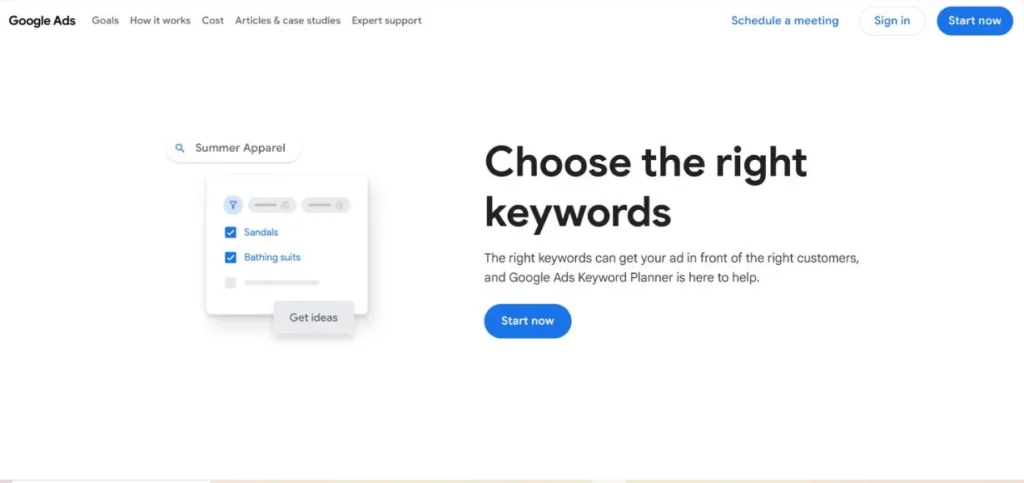
Google Keyword Planner. It is a free tool straight out of Google, which can assist advertisers (or website owners) in identifying useful keywords to use in their campaigns. Developed to serve Google Ads, it is now one of the best credible search engine optimization tools, used by search engine optimizers across the globe. The tool gives information that is directly available on the search engine Google, which is of extreme importance in perceiving search trends. It provides the simplest features that can fulfill the majority of the requirements in performing keyword research, particularly among the new entrants who are still learning the ropes in SEO.
Key Features:
- Free Google data access
- Search volume ranges shown
- Idea generation and Keyword generation were involved.
- Indicators of the level of competition are presented.
- Available geographic targeting options.
Pricing: Free (requires Google Ads account)
Website: https://ads.google.com/home/tools/keyword-planner
Must Read Blogs:
Best Alternatives to Google AdSense
2. SEMrush
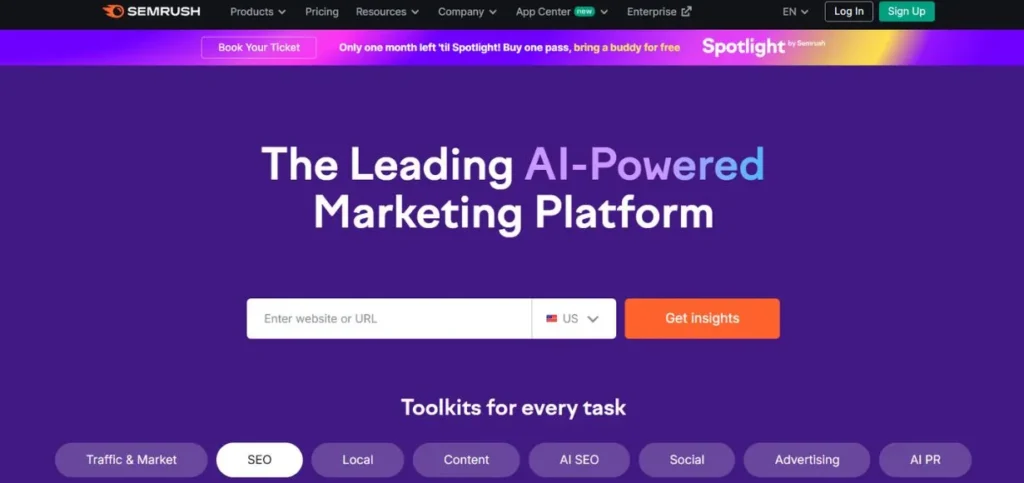
SEMrush is a digital marketing platform that is holistic and encompasses powerful tools of keyword research, among numerous others. It is regarded as one of the most professional search engine optimization research tools that provides information about competitor analysis and market dynamics in detail. The platform offers much information on the level of difficulty of a keyword, search trends, and SERP features, which make it popular among digital marketing agencies and large businesses. SEMrush is also a competitive analysis tool that enables the user to know the exact keywords that his/her competitors are ranking in and their performance.
Key Features:
- The availability of competitor keyword analysis.
- Some further filtering features were provided.
- Tracking of SERP features offered.
- Provided content gap analysis.
- Difficulty scores of keywords depicted.
Pricing: Starting at $119.95/month
Website: https://semrush.com
3. Ahrefs Keywords Explorer

Ahrefs Keywords Explorer belongs to the Ahrefs complete set of SEO tools, which has one of the biggest databases of keywords in the sphere. The tool is especially popular among the representatives of SEO due to the precision of the search volume data and advanced metrics on the keywords. Ahrefs is one of the most reliable paid keyword research resources because this company has earned a reputation for delivering reliable data that is very close to the actual search volumes. The suitable tool provides information about the NPV of the keywords, click-through rate, and trends in search activities in various nations and languages.
Key Features:
- Accurate search volume data
- Suggested parent topics
- Estimates of click-through rates are given.
- Several databases on countries in existence.
- Calculations of keyword difficulty are presented.
Pricing: Starting at $99/month
Website: https://ahrefs.com
4. Ubersuggest
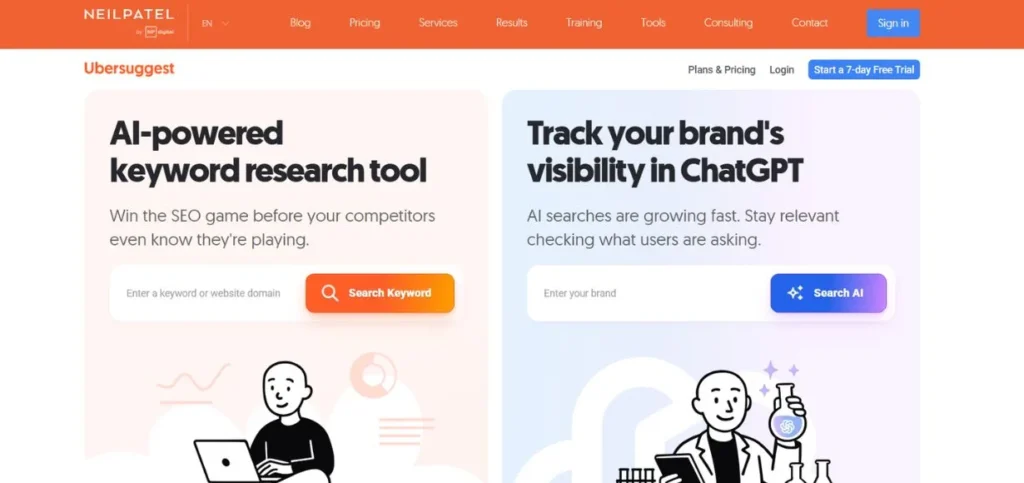
Ubersuggest is a tool developed by a marketing expert, Neil Patel, to be considered one of the most user-friendly tools in terms of keyword research today. It balances the two aspects of functionality and simplicity, which make it the best choice to suit small business proprietors and novices who require the capability of professional applications but not the complexity. The tool gives detailed information about the keyword, such as search volume, competition, and seasonal trends, and it has a beautiful user-friendly interface.
Key Features:
- Design of the interface that is user-friendly.
- The generation of content ideas is involved.
- Trend analysis of the season is offered.
- Available top pages analysis.
- Low-fare system provided.
Pricing: Starting at $12/month
Website: https://neilpatel.com/ubersuggest
5. Moz Keyword Explorer
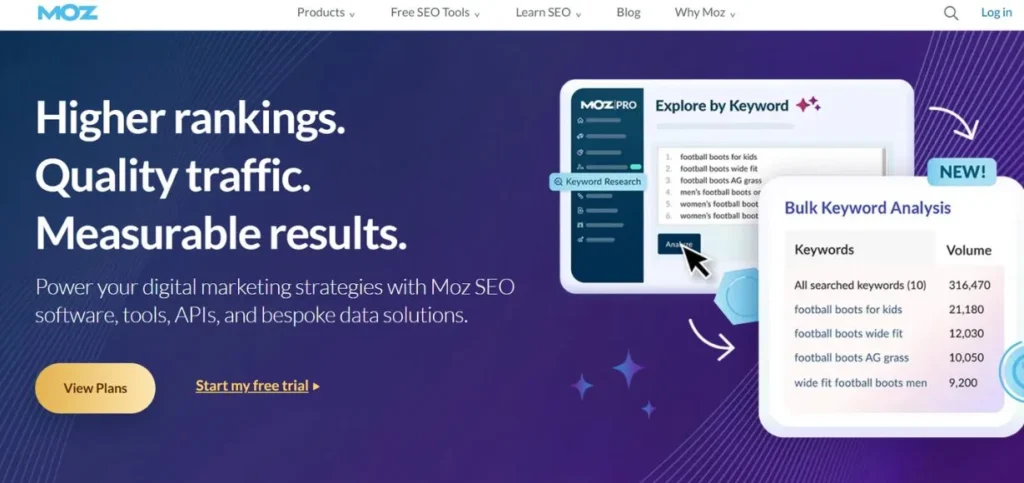
Moz Keyword Explorer belongs to the reputable Moz SEO toolkit, recognized for its educational design and high-quality information. One of the most appreciated features of this tool is the Priority Score that unites various measures to assist the user with filtering the most promising keyword opportunities. Moz has been the pioneer in the SEO industry over the years, and their keyword research software indicates that they have a great sense of the principles of search engine optimization. The tool comes with a complex SERP analysis that presents the users with what they are competing against using any given keyword.
Key Features:
- Calculations of priority scores were made to include.
- SERP analysis characteristics are available.
- Options for grouping keywords are available.
- Educational materials involved.
- Accuracy of data held.
Pricing: Starting at $99/month
Website: https://moz.com
6. KWFinder
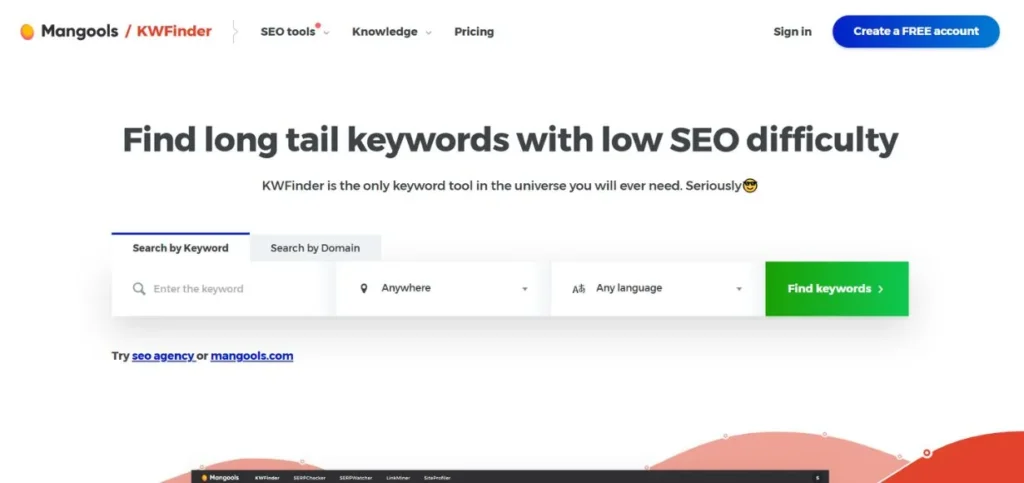
KWFinder is a search engine keyword tool created by Mangools and is aimed at identifying low competition keywords that can be more readily ranked within search engines. This renders it as one of the most useful keyword research tools for new websites and small businesses that will have to compete with the established players. The strength of the tool is that it is able to determine where the keyword opportunities exist that the bigger competitors might have missed. KWFinder visualizes search data in beautiful, intuitive visualizations, and complex SEO metrics are easy to understand even by beginners.
Key Features:
- Poor focus on competitive keywords.
- A beautiful data visualization was provided.
- The features of local SEO are available.
- Proper difficulty scoring presented.
- Rudimentary user-friendly interface design.
Pricing: Starting at $29.90/month
Website: https://kwfinder.com
7. AnswerThePublic
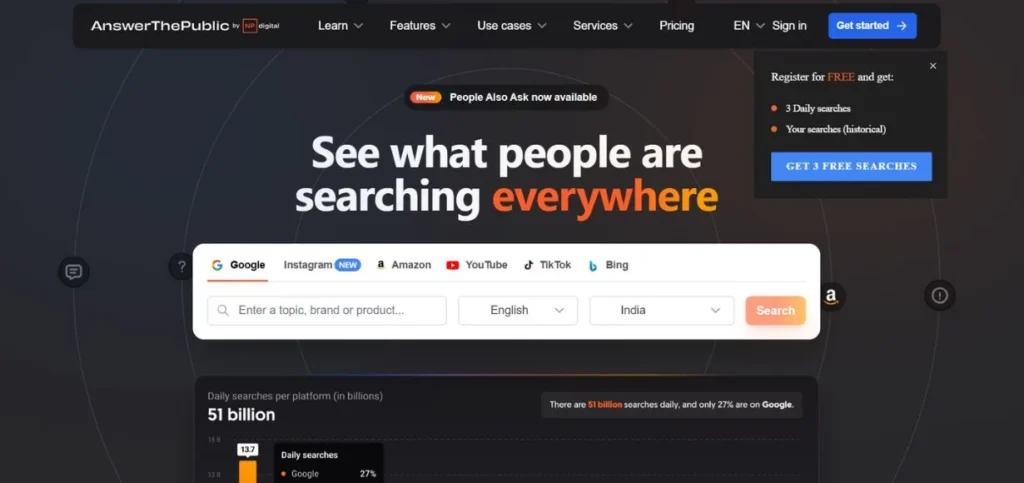
AnswerThePublic is a concept that is a take on keyword research, and it involves researching questions and phrases people literally search in search engines. The tool is extremely helpful in the minds of content creators who would like to see what kind of issues and questions their audience is posing about any particular issue. AnswerThePublic does not emphasize individual keyword search, as opposed to conventional keyword research tools; it shows the search patterns of natural language that people employ. This is ideal in the development of FAQs, blog posts, and user intent-specific content.
Key Features:
- Keywords discovery using questions was involved.
- Visual data presentation has been given.
- The analysis of natural language patterns.
- Idea generation in content provision.
- Knowledge about the intent of users.
Pricing: Free version available, paid plans start at $99/month
Website: https://answerthepublic.com
8. KeywordTool.io
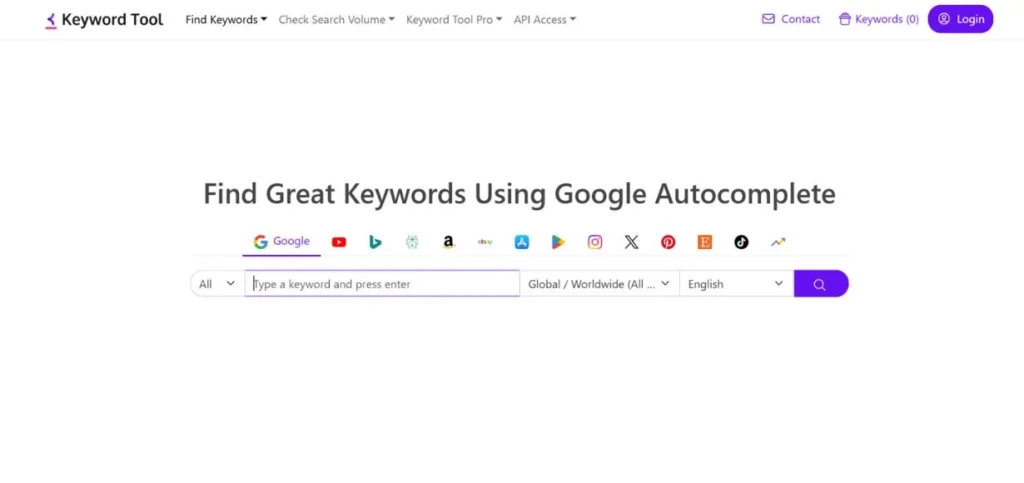
KeywordTool.io is a company specializing in the creation of long-tail keyword suggestions for various platforms such as Google, YouTube, Bing, Amazon, and social media websites. This is why it is considered to be one of the most flexible free keyword search tools, as it can be useful to a business that promotes its offer in various channels. The tool is good at identifying specific and longer phrases with less competition and high conversion rates. Its capability to create keywords for platforms other than Google is unique compared to the other keyword research tools, and users can optimize voice search, video, and e-commerce platforms.
Key Features:
- Multi-platform keyword generation.
- Specialization in long-tail keywords offered.
- Voice search optimization was included.
- Keywords discovery in e-commerce is provided.
- Easy and concise interface design.
Pricing: Free version available, Pro version starts at $69/month
Website: https://keywordtool.io
9. SpyFu
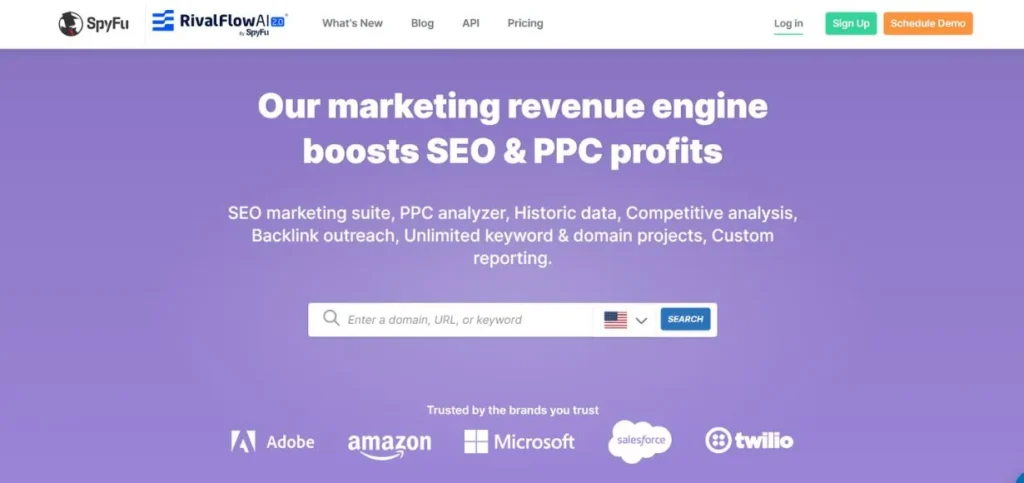
Competitor analysis is the main agenda of SpyFu and thus makes it one of the most strategic keyword research tools for businesses that would like to know and outdo their rivals. The tool enables users to view all the keywords that their competitors have ranked in the last 16 years and get unexplored details about how their competitors plan their SEO. SpyFu also displays the history of competitors’ advertising, where they have found profitable enough to spend money on advertising regularly.
Key Features:
- Available historical competitor statistics.
- PPC competitor analysis is involved.
- Ranking tracking is provided for keywords.
- Calculations of ROI estimation are presented.
- 16-year history of keywords accessed.
Pricing: Starting at $39/month
Website: https://spyfu.com
10. Serpstat
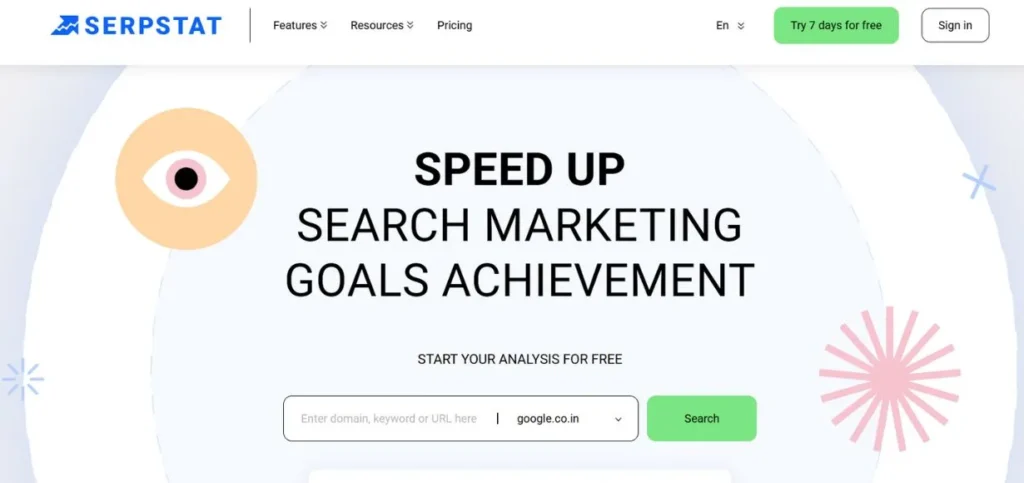
Serpstat is a one-stop tool for SEO, which entails a complete search of keywords, among other digital marketing capabilities. The tool is also exceptionally good in terms of the detailed keyword clustering and feature grouping, which enable users to structure their research into actionable content strategies. Serpstat is an assistant to price, and it provides enterprise-level services, which are affordable to small and medium enterprises. The platform has functionality for tracking the position of the keywords, competitor analysis, and site auditing.
Key Features:
- The capabilities of keyword clustering were available.
- A suggestion engine based on AI is offered.
- The price structure provided is competitive.
- Available API access functionality.
- Multi-language database support was provided.
Pricing: Starting at $55/month
Website: https://serpstat.com
How to Choose the Right Keyword Research Tools
- Think about your budget: Free keyword research tools are used by beginners since such free tools as Google Keyword Planner are very efficient, and paid tools provide more specific data and features.
- Match features to your needs: Select the tools that best suit your particular objectives, be it competitor analysis, local search engine optimization, or content creation assistance.
- Evaluate data accuracy: Find a keyword research tool that shows valid search volumes and one that updates its data regularly.
- Quality of the check user interface: Choose tools that have easy interfaces based on the level of technical skills, and that will not slow down your work process with a complicated interface.
- Taking into account integrating capabilities: Select tools that are compatible with the one you already have, and a marketing stack that can export data in the format you require.
Common Mistakes to Avoid
- Searching just the high-volume keywords: Most beginner marketers focus on commonly used keywords, and they fail to see the popular opportunities, but long-tail keywords, which are easier to rank early.
- Search intent: totally ignored: When one picks up keywords without knowing the reason why people are searching them, then they end up with irrelevant material that is not what the users want.
- Using only one tool: The shortcuts of a single keyword research tool restrict your vision and may result in missing an important opportunity presented by the other tools.
- Ignoring the competition levels: There is no point in using keywords that are too competitive for your domain authority, since it is a waste of time and resources in unattainable ranking objectives.
- Failure to refresh the research: Keywords are dynamic, and thus, up-to-date research may become obsolete, resulting in ineffective strategies.
Conclusion
Anyone who takes the issue of enhancing the visibility of the website in the search engine must have keyword research tools. You can either use free keyword research tools, such as Google Keyword Planner, or you can invest in paid keyword research tools, such as SEMrush, but the point is to use them regularly.
The appropriate keyword research software will turn your SEO strategy from guesswork into a data-driven strategy that can give actual results. It is important to keep in mind that the software for SEO keyword research is only the tip of the iceberg. The magic is in the fact that you use the insights that these tools give you in order to make valuable content, which serves the needs of your audience.
Begin by searching with one or two keyword research tools, within your budget and in the features that meet your needs, and then start adding more tools to your arsenal as you become more familiar with keyword research. Keywords research tools are achieved through regular use and constant processing. The digital world has evolved, and those businesses and content creators who learn to handle the tools will never fail to gain an edge in winning the interest of their perfect audience by using search engines.
Frequently Asked Questions
1. What are the most useful free tools for researching keywords as a beginner?
Google Keyword Planner and the free version of Ubersuggest are the best places to start. AnswerThePublic also provides helpful question-based key insights at no cost, so it is perfect in terms of providing knowledge of how to research keywords without wasting money on beginners.
2. Which frequency should I set with the help of keyword research tools to revise my strategy?
You are expected to do keyword research every quarter at least, and check trending topics within your industry at least once a month. Search engine optimization tools will ensure that you are up-to-date with the shift in search terms and seasonal changes that might affect your plan.
3. Can small businesses compete with large companies through the use of keyword research tools?
Absolutely! The actual leveling of the field is that the keyword research tools allow small businesses to find the low competition long-tail keywords, which sometimes large companies disregard. Stick to the specific, local, and niche keywords that you can be competitive at.
4. What is the difference between a free and/paid keyword research tool?
Free search engine tools offer simple information and lack functionalities, whereas paid ones offer more specifics, competitor reports, previous data, and fine-tuning capabilities. Paid tools are also characterized by more precise search volume data and extra SEO capabilities.
5. What makes me know whether my keyword research tools are providing the right data?
Compare cross-reference data on several keyword research tools and compare their recommendations with your real-life analytics of your website. Search for tools that update their databases frequently and are well known in the SEO industry as being data accurate.
